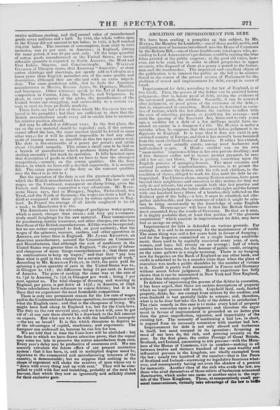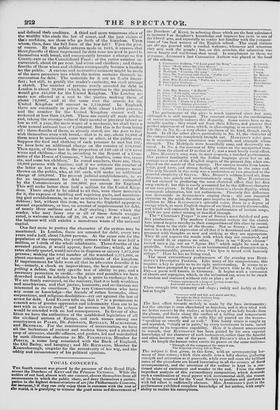ABOLITION OF IMPRISONMENT FOR DEBT.
WE have been reading a pamphlet on this subject, by Mr. HAUT s, the Member for Lambeth,—one of those useful, act ive, and
intelligent men of business introduced into the House of Commons
by the Reform Bill,—one of those troublesome interlopers who, ac- cording to Lord ASHBURTON'S prediction, would be reading the blue
folios printed at the public expense ; in the good old times, how- ever, not to be read, but in order to afford perquisites to upper seivants, who disposed of them at a penny a pound to the butter- man and the trunkinaker. The important and excellent object of the publication is to interest the public in the bill to be reintro- duced in the course of the present session of Parliament for the abolition of arrest and imprisonment for debt, except in cases of fraud.
Imprisonment for debt, according to the law of England, is of two kinds. First, the person of the debtor can be arrested before judgment,—that is, before proof of debt, saving the evidence of
the interested party, the creditor. Secondly, it can be arrested after judgment, or proof given of the existence of the debt,—
that is, imprisoned in execution. Both may be described as varie- ties of torture, which the law allows the creditor to inflict with the view of extorting payment, or gratifying his revenge : and until the passing of the Insolvent Act, three-and-ta enty years ago, a creditor for a debt of a few shillings might have im- mured an enemy in a dungeon fur life. Mr. Hawas is under a mistake when he supposes that the arrest before judgment is in- digenous to England. It is true that it does not exist in any civilized country of Europe, and that it has recently been banished from the most civilized States of America. It either has existed, however, or now actually exists, among most barbarous and
half-civilized priapic. A Hindu() creditor can on his own " mere motion "imprison a debtor in his own private dwelling; and if this durance suffice not to insure prompt payment, he may add a few saluiary blows. This is gaining something upon the English practice of spunging-houses. The more common and rational practice of semibarbarians, however, is to permit the creditor to reduce the debtor, with his wife and children, to the condition of slaves, obliged to work ter him until the debt be ex- tinguished. The Chinese alone, among Eastern nations, have gone beyond their neighbours and ourselves in this matter, for they not only do not tolerate, but even punish both this last practice and arrest beforejudgment, the latter offence with eighty and the former with one hundred heavy blows of a bamboo, duly inflicted on the fleshiest part of the body,—a law, it must be admitted, not alto- gether indefensible, and the existence of which it might be salu- tary to bring occasionally to the knowledge of some English creditors. MONTESQUIEU will have it that the British Govern- ment emanated from the woods of Germany. Be that as it may, it is highly probable that, at least that portion of "the glorious constitution" which consists in imprisonment for debt, may have had so savage an origin. Imprisonment for debt is defended on various grounds. For example, it is said to be necessary for the maintenance of credit. The same thing was said a few years back in favour of hanging; and for the forgeries committed on a single banking establish- ment, there used to be capitally convicted every year, of men, women, and boys, full twenty on an average; half of which number have been seen, for the honour of public credit, swinging on the same gallows in a single morning. There is no hanging now for forgeries on the Bank of England or any other bank, and credit is admitted to be in a sounder state than when the place of execution was made a public shambles by the number of victims to it. Credit is pretty well maintained in France and Germany without arrest before judgment. Recent experience has fully shown that it can be maintained in New York and New England, without this inhuman expedient. In defence of imprisoning the person of the debtor in execution, it has been urged, that there are certain descriptions of property which no legal process will reach. Copyhold land, cash, funded property, debts, &c. are exempt from seizure by the creditor, and even freehold is but partially liable to seizure; and, therefore, what is to be done but take the body of the debtor in satisfaction ? The plain remedy in this case is to make every kind of property subject to execution upon a judgment; and therefore the argu- ment in favour of imprisonment is grounded on no better plea than the gross imperfection, injustice, and impartiality of the existing law. The necessity of continuing a bad law, in short, is argued from its necessary connexion with another bad law. Imprisonment for debt is not only absurd and barbarous in itself, but most unequal in its operation ; favouring as most of our laws do, the rich, and pressing severely on the poor. In the first place, the entire Peerage of Great Bntam, Scotland, and Ireland, amounting to 606 persons—with the Mem- bers of the House of Commons, 658 in number—making in all between twelve and thirteen hundred of the most wealthy and influential persons in the kingdom, are wholly exempted from the law ; nearly two hundred of the number—that is the Peers of Scotland and Ireland—exercising no legislative functions what- ever, and consequently having not even the shadow of a pretext for immunity. Another class of the rich who evade the law, are those who avail themselves of those relicts of barbarism misnamed Sanctuaries, which under one name or another exist in the capi- tals of the Three Kingdoms. These, at comparatively small per- sonal inconvenience, virtually take advantage of the law to bailie
One fact more to portray the character of the system may be mentioned. In London, there are arrested for debt, every two years and a half, about 70,000 persons. At the same rate for the
population of the empire, the yearly arrests would be near half a million, or 1-48th of the whole inhabitants. Three-fourths of the
arrested parties, it would appear, have families; which, at the rates already quoted, would involve in disgrace or misery 1,875,000 persons; making the total number of the wretched 2,375,000, or about one-tenth part of the entire inhabitants of the kinfolom.
If imprisonment for 'debt were all that its advocates describe it to be,—namely, a check on improvidence, the best means of com- pelling a debtor, the only specific test of ability to pay, and a
necessary protection to credit,—the pains and penalties we have described would be infinitely too high a price to exchange for it. We are firmly convinced, on the contrary, that it is both worthless and mischievous, and that justice, humanity, and civilization are interested in its overthrow. The very Conservatives who have any sense or knowledge—the friends of rotten boroughs, close corporations, and religious disabilities—cry out against the law of' arrest for debt. Lord ELDON tells us, that it " is a permission to commit acts of greater oppression and inhumanity than are to be met with in slavery itself; " and lie assures us that its redress would be attended with no bad consequences. In favour of abo- lition we have the authorities of the established legislation of all
the civilized nations of Europe, and such names among our C01.111tryIllen RS PALEY, Dr. JOHNSON, ROMILLY, MACKINTOSH, the civilized nations of Europe, and such names among our C01.111tryIllen RS PALEY, Dr. JOHNSON, ROMILLY, MACKINTOSH,
and BENTHAM. For the continuance of incarceration, we have all the barbarians of ancient and modern times, and a plentiful crop of attornies, sheriffs'-oflicers, and gaolers, led and marshalled
by such illustrious obscures as Mr. PRESHFIELD, Member for Penrsn, a name long associated with the Bank of England, the Old Bailey, and hanging ; and Mr. RICHARDS, Member for Knaresborough, singular for the eccentricity of his wig, and the oddity and inconsistency of his political opinions.



























 Previous page
Previous page